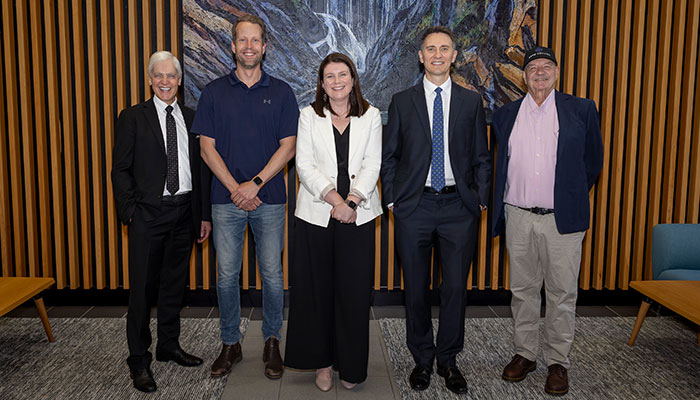The move will significantly expand the University’s semiconductor research and education capabilities and deliver an important boost to the industry in Australia.
Atto Devices designs advanced hardware platforms and custom silicon chips/chiplets that have applications in compute, communications and sensing for the research, defence and commercial markets. Atto Devices is founded by industry veterans Neil Weste, Jeremy Hallett and Mike Boers.
The SiP Lab, established within the Faculty of Science and Engineering, will focus on advanced silicon system-on-chip (SoC) and system-in-package (SiP) technologies. The SiP Lab will work to integrate quantum sensors, photonics, bioinformatics, biosensors and other emerging fields onto leading edge silicon platforms.
“The Silicon Platforms Lab and our partnership with Atto Devices represents a strategic investment in Australia’s semiconductor capabilities, complementing our existing strengths in wide bandgap materials and positioning Macquarie University at the forefront of this critical technology sector,” says Professor Dan Johnson, Pro Vice-Chancellor of Research, Innovation and Enterprise at Macquarie University.
The initiative brings together three key industry experts.
Industry Professor Boers, who will establish the lab, is an accomplished semiconductor researcher and brings extensive industry experience to his role as the leader of the new Silicon Platforms Lab, specialising in advanced silicon system-on-chip and system-in-package technologies.
Adjunct Professor Weste and Honorary Professor David Skellern AO, who will serve as mentors and advisors to the lab, bring decades of expertise as pioneers in VLSI design, semiconductor entrepreneurship and wi-fi technology innovation, bridging academic research with commercial applications in the industry.
“The SiP Lab will enable us to push the boundaries of silicon-based semiconductor research,” says Professor Boers, co-founder and Chief Technology Officer of Atto Devices.
“Having a partnership between the SiP Lab and Atto Devices creates a robust ecosystem for translating cutting-edge research into marketable products and enables us to help support the training and development of the next generation of engineers.”

This initiative builds on Macquarie University's established reputation in semiconductor research, including through the Macquarie Analog Devices Laboratory (MAD Lab) within the School of Engineering.
MAD Lab is renowned for its expertise in semiconductor modelling and circuit design for millimetre-wave and advanced material (including gallium nitride) semiconductors, with applications in specialist radio frequency systems.
Macquarie University Vice-Chancellor Professor S Bruce Dowton says, “The partnership between the University and Atto Devices creates a unique ecosystem mirroring successful industry-academia collaborations on the global stage, with the potential to foster breakthroughs in semiconductor technology while also developing the next generation of industry leaders.”
The initiative will enhance Australia’s sovereign capabilities in semiconductor technology, contribute to the global supply chain, and create new opportunities for research and education in the national semiconductor sector.



